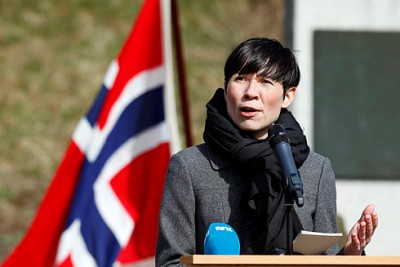Norwegian Defense Minister Ine Eriksen Søreide was topping speculation this week over who will replace Børge Brende as Norway’s new foreign minister. Brende is resigning to take on a new top job at the World Economic Forum in Switzerland, but his term isn’t ending on the high note expected.

Søreide, who has served as Norway’s defense minister since the current conservative government coalition first took power in October 2013, is widely viewed as the top candidate to become Norway’s next foreign minister. An announcement is expected on Friday, after the weekly Council of State at the Royal Palace where King Harald V must formally acknowledge new ministers, but it could come at any time.
The timing seems right this week. Not only is Brende’s calendar clear after he returns from a meeting of Barents-area foreign ministers in Archangelsk this week, it can be a good time for Søreide to move on as well. She just announced the latest round of restructuring of Norway’s defense at home, with a strengthening of forces in the northernmost county of Finnmak that’s closest to the Russian border. Objections continue over transfers of equipment and personnel from Troms and other areas, and how Army and Home Guard personnel will be deployed, but the reshuffle was widely viewed as “the last piece of the puzzle” falling into place as part of reforms and repositioning for the future.
Good marks
Søreide has received generally good marks during her tenure as defense minister both at home and abroad. The 41-year-old minister who grew up in Strømmen and Tromsø is educated as a lawyer but been active in the Conservative Party since her teens. She was first elected to Parliament in 2005, after moving to Oslo, and she led the parliament’s foreign affairs and defense committee as part of the opposition from 2009 to 2013. Her command of English is excellent and she already has an international network of contacts that would serve her well as a foreign minister.
She hasn’t wanted to comment on all the speculation swirling around her candidacy for the foreign minister’s post since Prime Minister Erna Solberg announced Brende had decided to resign. “I’m thriving with what I’m doing today,” is all Søreide would tell news bureau NTB this week. “How the boss (Solberg) makes use of her crew and her thoughts around that is her decision.”

Brende, meanwhile, has been facing heavy criticism in recent weeks on a variety of fronts. He won’t be leaving on the high note that might have been expected for a foreign minister who also survived all four years of the minority government’s term.
After years of rumbling about how Brende traveled the world constantly, and whether his absences were strictly necessary, concerns rose over whether Brende was losing touch with public sentiment at home. Concerns escalated to sharp criticism over what should have been the highlight of his career, when Norway finally restored diplomatic relations with China. They’d been frozen since China blamed Norway for its embarrassment and anger that one of its leading dissidents, who was jailed as well, had been awarded the Nobel Peace Prize in 2010. Mending relations with China had been Brende’s top priority when he took over as foreign minister in October 2013, but the task proved even more difficult than Brende expected and distractions quickly arose from Crimea and Ukraine to Syria and the rest of the Middle East, even Myanmar and the US, with its shock election of Donald Trump as president.
When Brende and Solberg finally announced last December that talks with China had succeeded, he was swiftly accused of caving in on the human rights issues he’d once held so dear, and for all but capitulating to the Chinese. Brende firmly denied any such thing, but then came more signs of having said one thing and doing another: Brende favoured a ban on nuclear weapons when he led the Red Cross but opposes one now, and while there’re lots of hand-wringing over the war in Yemen, questions arose over Brende’s visits to Saudi Arabia and whether Norway has supplied the country with arms allegedly used in attacks on Yemen. Brende has felt compelled to answer his critics in Norwegian media, where he claimed in one commentary that the Norwegian government “shares the vision of this year’s winners of the Nobel Peace Prize (the International Campaign Against Nuclear Weapons, ICAN), but we have different intepretations of how to carry them out.”
Things came to a head last week when Norwegian Broadcasting (NRK)’s nightly foreign affairs program Urix confronted Brende with a critical review of his term as foreign minister and all but suggested he was guilty of hypocrisy. Brende bristled on air, claiming the review was unbalanced and that he disagreed with the program leader’s assessments and claims. That was followed up by a written complaint to NRK over the program from a political adviser in the Foreign Ministry, Bård Ludvig Thorheim, who called the Urix program “misleading” and biased, characterized by “steady interruptions” from the program leader (one of NRK’s former foreign correspondents based in Brussels). Thorheim also denied that Norway sells arms to Saudi Arabia or that any “Norwegian military material” is used in violation of human rights in Yemen.
That in turn brought counter-criticism from the leader of the organization Changemaker in Norway, Tuva Krogh Widskjold, who wondered whether Norwegian foreign policy is off limits to criticism. She also lashed out at the criticism of NRK’s journalists: “It’s worrisome when politicians criticize the media for doing their job.”
After having to defend himself often in recent months, Brende may well be eager to turn over Norway’s foreign ministry to a new political leader. Solberg may also announce other changes in her ministerial line-up following the election last month, as her minority government faces another four-year term but with new dynamics in Parliament and without any guarantee of support from other parties that can help it survive this time around.
newsinenglish.no/Nina Berglund

